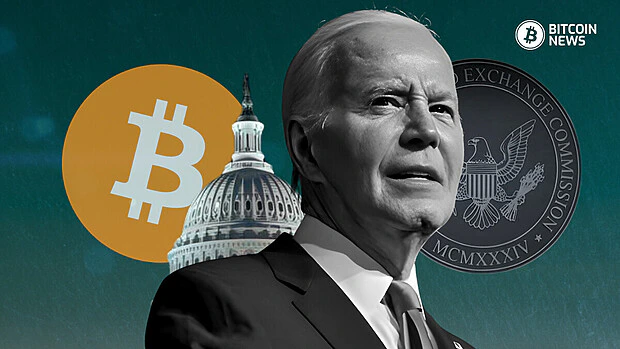U.S. President Joe Biden vetoed a resolution aimed at overturning a controversial Securities and Exchange Commission (SEC) bulletin. This decision underscores the administration’s reluctance to change current strict regulatory standards in the burgeoning field of digital assets.
The focus of this controversy is the SEC’s Staff Accounting Bulletin No. 121 (SAB 121). This bulletin provides guidance on how financial institutions should account for digital asset holdings.
Specifically, it requires firms that custody bitcoin to record it as a liability on their balance sheets. The SEC argues that this measure enhances transparency and protects investors by providing clearer insight into the risks associated with holding digital assets.
However, the bulletin has faced significant backlash from the Bitcoin industry and some lawmakers.
Critics argue that SAB 121 imposes undue burdens on financial institutions, potentially discouraging them from offering bitcoin custody services and stifling innovation in this sector.
Related: “Bitcoin Is In Danger In U.S.” — Warns Paul Tudor
In response to these concerns, both the House of Representatives and the Senate passed a resolution to repeal SAB 121.
The House passed the measure with a vote of 228-182, and the Senate followed with a 60-38 vote. The resolution received bipartisan support, with several Democrats joining Republicans in opposing the SEC guidance.
Despite this bipartisan push, President Biden made it clear that he would veto the resolution. In a statement to Congress, Biden emphasized the importance of maintaining current regulatory frameworks to “protect consumers and investors”.
In his formal message to the House of Representatives, President Biden detailed his reasons for the veto. He emphasized that the SEC’s staff had provided “considered technical views” on the accounting obligations of firms safeguarding digital assets.
He criticized any action limiting the SEC’s ability, stating:
“Limiting the SEC’s ability to maintain a comprehensive and effective financial regulatory framework for crypto-assets would introduce substantial financial instability and market uncertainty.”
Further discussing the matter, an SEC representative stated in a press release that numerous digital asset firms have failed, leaving customers to seek their assets in bankruptcy courts.
The representative highlighted the risks to investors when firms hide assets off their balance sheets and emphasized that disclosures are crucial for providing investors with insight into the risks taken by digital asset custodians.
The president’s veto has been met with disappointment and criticism from the Bitcoin community. The Blockchain Association, a prominent digital asset advocacy group, expressed their dismay in a social media post, stating:
“We’re disappointed that the admin chose to overrule bipartisan majorities in both Houses of Congress who recognized the harm created by SAB 121.”
Other industry leaders echoed this sentiment. Cody Carbone, the chief policy officer of the Digital Chamber, remarked that the decision was “a slap in the face to innovation and financial freedom.”
The debate over SAB 121 is part of a larger conversation about how to regulate the rapidly evolving Bitcoin and digital assets market.
The industry has been calling for clearer regulations to provide certainty and foster growth. However, regulatory bodies like the SEC have been cautious, emphasizing the need to protect investors and maintain financial stability.
Related: Coinbase SEC Petition Denied: “Existing Laws Already Apply”
The veto of the SAB 121 repeal is not the end of the conversation about digital asset regulation.
Biden has indicated a willingness to collaborate with lawmakers on crafting legislation that addresses the unique challenges and opportunities presented by digital assets.
He has expressed openness to working on a “balanced regulatory framework for digital assets” that promotes responsible development and reinforces the United States’ leadership in the global financial system.










